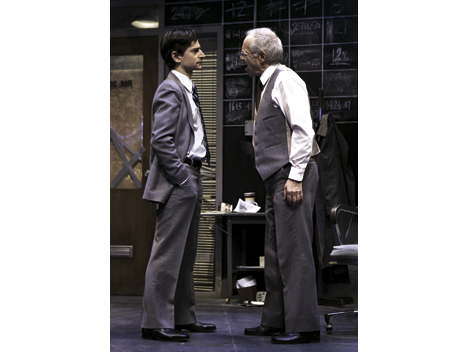Glengarry Glen Ross: timely and timeless

Theatre tackling the issues of the day is often referred to as ‘timely’, whereas theatre touching on themes as old and persistent as humanity itself is dubbed ‘timeless’. In those instances when the two overlap there is no single term to encapsulate the idea, but suffice to say it is a rich experience and Toronto’s "Soulpepper Theatre":http://www.soulpepper.ca/ has brought just such an experience to the stage with their production of David Mamet’s pointed signature work, *Glengarry Glen Ross*.
Soulpepper has assembled a robust creative team, including Albert Schultz, Eric Peterson, and director David Storch but the biggest star on stage is indisputably Mamet’s script - and that is not a slight against the aforementioned artists. The reality is the same could be said for most productions of GGR; whether it be Jack Lemon and Al Pacino in the 1992 film version, or Alan Alda and Liev Schreiber in the latest Broadway edition, Mamet’s carefully crafted machine-gun dialogue and calculated narrative renders any actor, no matter how famous, subservient to the work.
Set in the cut-throat world of real estate land sales, Glengarry Glen Ross revolves around a seedy cast of salesmen vying for the top spot in an in-office contest. The contest and its prize, a brand new Cadillac, is simply the catalyst that feeds the men’s true ambitions: money, respect, and an almost animalistic desire for domination over each other. It is when the office is ransacked and valuable sales leads disappear that their already dog-eat-dog existence becomes that much more cannibalistic.
The narrative arc of GGR spans only a day and a half, but it is more than enough time to leave the audience feeling as though they have come to know the characters intimately - if not biographically, then psychologically. The word “microcosm” comes to mind when thinking of the world of the play, but to apply that term would be giving Mamet’s fictional sales team more credit than they deserve. Rather, they are inward looking sharks who are so unconcerned with the world outside their own that even their racial biases are shaped by sales figures. To them, happiness and satisfaction are fleeting emotions that are only generated by having more money in their pocket than the next guy, or failing that, watching the next guy self-destruct.
If there is a common complaint about Mamet’s style it is his indulgent, almost hedonistic, use of four letter words. Reliance on “naughty language” for shock effect is usually the sign of a limited playwright, but in Mamet’s case, the often dropped “fucks”, “fuckers”, and “cocksuckers” are used as rhythmic punctuation. Given that GGR’s principal characters’ existences are so reliant on superficial monetary statistics, it is fitting that their vocabulary would be equally narrow.
The cast, led by Soulpepper’s artistic director Albert Schultz, deserves a great deal of credit for not only being able to keep up with the breakneck script, but to infuse it with their own subtle, if tangible, flavour. It would have been easy for the performers to dwell on and hone the famous rat-tat-tat of Mamet’s dialogue, but they choose instead to round the edges a bit, rendering their characters more organic and less like stylized exaggerations.
Eric Peterson and Jordan Pettle deliver solid performances in their respective roles as fading sales star Shelly “The Machine” Levene, and crafty office manager John Williamson. Peterson is convincingly frustrated and dour as a lion past his prime, while Pettle delivers the dichotomy of his withdrawn but commanding character with tact.
Schultz, as the slick sales board leader Richard Roma, and William Webster as the skittish and sheep-like George Aaronow, are the stand-outs of the cast. Schultz uses his character’s initial ambiguity to keep his cards close, making the eventual unveiling of his true snake-like nature that much more dramatic. It is in the second act that Schultz dominates, spewing venom with the same ease that most recite the alphabet while physically towering over the other characters. Webster brings a well needed element of pathos and humour to the piece with his disarmingly panicked state, and later, a spectacular meltdown that is both glorious and cringe-worthy.
Director David Storch guides the piece with a gentle hand that keeps grandstanding to a minimum while keeping the adrenaline high. Instead of pushing the characters around like warring chess pieces, Storch imbues them with subtle impotence and self-loathing that adds an extra layer of complexity to their bombastic nature and reduces the emotional distance between them and the audience.
Having said that, it’s a distance that many would prefer to be as wide as possible. Although Mamet based GGR on his experience working in a Chicago real estate office in the late 60s, and wrote it in the early 80s, the unsavoury themes of the play resound just as loudly as ever. Greed, the lust for power, and the thrill of conquest are as timeless and constant as humanity, while the bilking of innocents, the manipulation of the system for sheer profit’s sake, and the downfall of the prosperous are timely ideas that mesh perfectly with the present day news cycle. It’s a one-two punch that should not be missed.
_Glengarry Glen Ross, produced by Soulpepper Theatre Company; Written by David Mamet; Directed by David Storch; Set Design by Ken MacDonald; Performed by Kevin Bundy, Peter Donaldson, Stephen Guy-McGrath, Eric Peterson, Jordan Pettle, Albert Schultz and William Webster. Playing at the Young Centre for the Performing Arts from April 2 – May 9; for more information go_ "here":http://www.soulpepper.ca/



